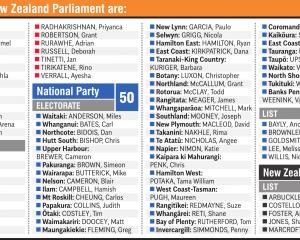
Meanwhile, the Act Party is calling on National to be bolder while the Green Party claims it prioritises wealthy property investors over low and middle-income earners.
National leaders Christopher Luxon and Nicola Willis today unveiled their party’s $14.6 billion tax policy package, paid for by about $8.4b of cuts and $6.2b of revenue increases including taxing foreign buyers - after National ends the foreign buyers ban for some homes, online gambling, and raising charges on some visas.
Luxon said the plan would target the "squeezed middle" by lifting income tax brackets to compensate for inflation. The party has called it a "Back Pocket Boost".
The $14,000 threshold will rise to $15,600; the $48,000 threshold will rise to $53,500 and the $70,000 threshold will rise to $78,100.
Those changes will mean tax cuts to earners. Someone earning $60,000 will get an extra $50 a fortnight. A household on $120,000 without children would get $100 a fortnight and an average income household with children would get $250 a fortnight.
A superannuitant couple would get $26 a fortnight.
The plan includes four main tax changes, three of which trigger on July 1, 2024.
These are:
• Shifting income tax brackets to compensate for inflation
• Expanding tax credits to reach more modest income earners
• Introducing the FamilyBoost childcare tax credit
• Increasing Working for Families tax credits for working families (from April 1, 2024).

• $594 million on average per year reduction in spending on back-office functions in government departments, excluding non-core and frontline agencies - this would come on top of Labour’s cuts announced on Monday.
• $400m on average per year reduction in government spending on consultants - this would come on top of Labour’s cuts announced on Monday.
• $590m on average per year Climate Dividend, returning taxes raised on climate polluters to Kiwi families rather than giving subsidies to large corporates.
The tax hikes include:
• $740m on average per year from introducing a 15 per cent foreign buyer tax on purchase of houses worth over $2 million
• $525m on average per year from ending the commercial building depreciation tax break
• $179m on average per year from closing a tax loophole and ensuring offshore operators delivering online gambling to New Zealanders, pay tax. Labour has itself looked at closing the loophole for online gambling, but reckons it is difficult.
• $123m on average per year from moving to user-pays immigration levies, excluding tourist visas
Labour’s finance spokesman Grant Robertson said National’s cuts to public services were more than double what the Government announced on Monday.
"National will be asking for eight per cent cuts in many agencies and therefore they will not be able to protect frontline services.
"The Government announced earlier this week moderate restraint of public service spending, which would protect frontline services. National’s cuts will gut the agencies that support Kiwis."
Robertson claimed National’s costing of revenue it expected to gather through its proposed taxes looked "dodgy".
"National is laying out some voodoo costings today with their claim to be able to grab $740 million per year from foreign buyers.
"The plan relies on more and more foreign buyers coming into the New Zealand market every year, despite putting a tax on them.
"It also beggars belief that there are that number of homes available every year to be bought up by foreigners to fund National’s tax cuts."

"Tax bracket indexation is exactly what it sounds like: Labour’s tax policy adjusted for inflation.
"It’s not a tax cut, it’s tinkering that freezes the unfairness of Labour’s tax policy in time. That’s just not good enough for New Zealand, we don’t need to trim the sails, we need a turn-around job."
National also proposed to restore interest deductibility for landlords with an expectation it would decrease rent prices. It wouldn’t be reinstated immediately upon National entering government, it would be phased in over three years.
Seymour said National should adopt Act’s plan to bring it in straight away.
"Landlords have been hit with a double whammy of rising mortgage interest rates and increasing interest deductibility limitations during a cost-of-living crisis.
"The pressure on landlords and tenants is severe and they need relief now, not in the future."

"National’s plan is a cynical ploy to do the absolute least for middle-income earners in order to get away with tax cuts for the wealthiest few," he said.
"Under National’s plan, people on the lowest incomes would miss out while high-income property speculators can continue to line their pockets."
He also criticised National’s slashing of public spending as uncertain "pie-in-the-sky stuff" as opposed to the Greens’ policy to create a wealth tax on top earners in New Zealand to fund things like free dental care for all.
The Act Party was likely to be National’s main coalition partner and therefore could have some sway over National’s policy.
However, some polls indicated the pair might need extra support to form a government. That could come in the form of NZ First, as long as it reached the five per cent threshold to enter Parliament (the party was currently polling between three and six per cent).
NZ First leader Winston Peters believed basing an economic plan on immigration and house prices was not prudent.
"They are clearly relying on mass immigration and a mass foreign buy-up of Kiwi homes to fund its tax cuts and their ‘squeezed middle’ will be squeezed further."










